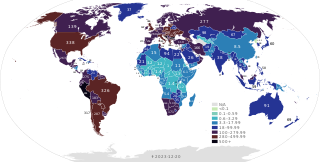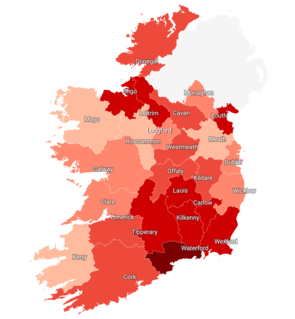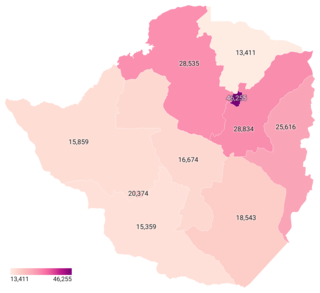Related Research Articles
2020 (MMXX) was a leap year starting on Wednesday of the Gregorian calendar, the 2020th year of the Common Era (CE) and Anno Domini (AD) designations, the 20th year of the 3rd millennium, the 20th year of the 21st century, and the 1st year of the 2020s decade.
2021 (MMXXI) is the current year, and is a common year starting on Friday of the Gregorian calendar, the 2021st year of the Common Era (CE) and Anno Domini (AD) designations, the 21st year of the 3rd millennium, the 21st year of the 21st century, and the 2nd year of the 2020s decade.

The COVID-19 pandemic, also known as the coronavirus pandemic, is an ongoing global pandemic of coronavirus disease 2019 (COVID-19) caused by severe acute respiratory syndrome coronavirus 2 (SARS-CoV-2). The virus was first identified in December 2019 in Wuhan, China. The World Health Organization declared a Public Health Emergency of International Concern regarding COVID-19 on 30 January 2020, and later declared a pandemic on 11 March 2020. As of 6 June 2021, more than 173 million cases have been confirmed, with more than 3.72 million confirmed deaths attributed to COVID-19, making it one of the deadliest pandemics in history.

This article provides a general overview and documents the status of locations affected by the severe acute respiratory syndrome coronavirus 2 (SARS-CoV-2), the virus which causes coronavirus disease 2019 (COVID-19) and is responsible for the COVID-19 pandemic. The first human cases of COVID-19 were identified in Wuhan, the capital of the province of Hubei in China in December 2019. The most recent country or territory to report its first confirmed case was Palau on 31 May 2021.

The COVID-19 pandemic in the United States is part of the worldwide pandemic of coronavirus disease 2019. More than 33.3 million confirmed cases have been reported since January 2020, resulting in more than 597,000 deaths, the most of any country, and the eighteenth-highest per capita worldwide. As many infections go undetected, the Centers for Disease Control estimates that as of March 2021, there have been a total 114.6 million infections in the United States. The U.S. has about one-fifth of the world's confirmed cases and deaths. COVID-19 became the third-leading cause of death in the U.S. in 2020, behind heart disease and cancer. U.S. life expectancy dropped from 78.8 years in 2019 to 77.8 years in the first half of 2020.

The COVID-19 pandemic in the United Kingdom is part of the worldwide pandemic of coronavirus disease 2019 caused by severe acute respiratory syndrome coronavirus 2. The virus reached the UK in late January 2020. As of 30 May 2021, there had been 4.5 million cases confirmed and 128,030 deaths overall among people who had recently tested positive – the world's sixteenth-highest death rate by population and the highest death toll in Europe. There have been 153,093 deaths where the death certificate mentioned COVID by 14 May 2021. There has been some disparity between the outbreak's severity in England, Scotland, Wales and Northern Ireland – health in the UK is devolved, with each of the four having its own publicly funded healthcare system and government.
The COVID-19 pandemic in Bahrain is part of the worldwide pandemic of coronavirus disease 2019 caused by severe acute respiratory syndrome coronavirus 2. The virus was confirmed to have reached Bahrain on 21 February 2020. As of 6 June 2021, there have been a total of 249,582 confirmed cases in the country, of which 225,159 have recovered and 1,091 have died. A total of 4,716,287 PCR tests were conducted since the start of the pandemic.

The COVID-19 pandemic in the Republic of Ireland is part of the worldwide COVID-19 pandemic caused by severe acute respiratory syndrome coronavirus 2 (SARS-CoV-2). The virus reached the country in late February 2020 and within three weeks, cases had been confirmed in all counties. The pandemic affected many aspects of society. The government shut all schools, colleges, childcare facilities and cultural institutions on 12 March 2020. All large gatherings were cancelled, including St Patrick's Day festivities two years running. On 24 March 2020, almost all businesses, venues and amenities were shut, and on 27 March, the first stay-at-home order banned all non-essential travel and contact with other people. The elderly and those with certain illnesses were told to cocoon. People were made to keep apart in public. The Oireachtas passed an emergency act giving the state power to detain people, restrict travel and keep people in their homes to control the virus's spread. Further emergency law passed the following week. The Garda Síochána were given power to enforce the lockdown, which was repeatedly extended until late May.

The COVID-19 pandemic in Sri Lanka is part of the ongoing worldwide pandemic of coronavirus disease 2019 (COVID-19) caused by the severe acute respiratory syndrome coronavirus 2 virus. The first case of the virus in Sri Lanka was confirmed on 27 January 2020, after a 44-year-old Chinese woman from Hubei, China, was admitted to the Infectious Disease Hospital in Angoda, Sri Lanka. As of 12 May 2021, a total of 131,098 active cases have been recorded in the country, 107,657 patients have recovered from the disease, and 850 patients have died from the pandemic.

The COVID-19 pandemic in Guyana is part of the worldwide pandemic of coronavirus disease 2019 caused by severe acute respiratory syndrome coronavirus 2. The virus was confirmed to have reached Guyana on 11 March 2020. The first case was a woman who travelled from New York, a 52-year-old woman suffering from underlying health conditions, including diabetes and hypertension. The woman died at the Georgetown Public Hospital.
The COVID-19 pandemic was confirmed to have reached Tanzania in March 2020.

The COVID-19 pandemic was confirmed to have reached Zimbabwe in March 2020. Some of Zimbabwe's provinces, especially Manicaland, Masvingo and Mashonaland East, also struggled with a malaria outbreak at the same time. Though malaria is treatable, the healthcare system faces drug shortages and increased strain with the spread of COVID-19.

The COVID-19 pandemic has impacted politics, both international and domestic, by affecting the governing & political systems of multiple countries, causing suspensions of legislative activities, isolation or deaths of multiple politicians and reschedulings of elections due to fears of spreading the virus. The pandemic has triggered broader debates about political issues such as the relative advantages of democracy and autocracy, how states respond to crises, politicization of beliefs about the virus, and the adequacy of existing frameworks of international cooperation. Additionally, the pandemic has, in some cases, posed several challenges to democracy, leading to it being fatally undermined and damaged.

The COVID-19 pandemic reached Northern Ireland on 27 February 2020. The Department of Health reports 2,154 deaths overall among people who had recently tested positive. The Northern Ireland Statistics and Research Agency reports 2,974 where the death certificate mentioned COVID as one possible cause. Northern Ireland has the lowest COVID death rate per population in the United Kingdom. The vast majority of deaths were among those over the age of 75 and almost half were in care homes. Northern Ireland also has a much higher vaccination rate per population than the neighbouring Republic of Ireland.

The following is the timeline of the COVID-19 pandemic in India from January 2020 through May 2020.

In Gujarat, the first two cases of the COVID-19 were confirmed on 19 March 2020 in Rajkot and Surat.

The first case of the COVID-19 pandemic in the Indian state of Assam was reported on 31 March 2020. As of 6 June 2021, the Government of Assam has confirmed a total of 89,468 positive cases of COVID-19 including 67,641 recoveries, three migrations and 234 deaths in the state. The state's as well as northeast's largest city, Guwahati, has been worst affected by coronavirus.

The first case of the COVID-19 pandemic in the Indian state of Rajasthan was reported on 2 March 2020 in Jaipur. The Rajasthan Health Department has confirmed a total of 29,835 cases, including 563 deaths and 21866 recoveries as of 20 July 2020. All districts in the state have reported confirmed cases of which, Jaipur is the worst-affected.
The COVID-19 pandemic is an ongoing viral pandemic of coronavirus disease 2019 (COVID-19), a novel infectious disease caused by severe acute respiratory syndrome coronavirus 2 (SARS-CoV-2). The pandemic has affected the Cities of Mississauga and Brampton, and the Town of Caledon, within the Regional Municipality of Peel. As part of the larger closure decisions in Ontario, a stay-at-home order shuttered all nonessential businesses, and caused event cancellations.

Overseas Filipinos, including Filipino migrant workers outside the Philippines, have been affected by the COVID-19 pandemic. As of June 1, 2021, there have been 19,765 confirmed COVID-19 cases of Filipino citizens residing outside the Philippines with 12,037 recoveries and 1,194 deaths. The official count from the Department of Foreign Affairs (DFA) on the cases of overseas Filipinos is not included in the national tally of the Philippine government. Repatriates on the other hand are included in the national tally of the Department of Health (DOH) but are listed separately from regional counts.